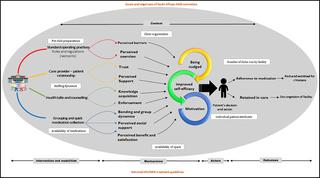PLOS ONE ( IF 2.9 ) Pub Date : 2019-01-16 , DOI: 10.1371/journal.pone.0210565 Ferdinand C. Mukumbang , Brian van Wyk , Sara Van Belle , Bruno Marchal

|
Background
Although empirical evidence suggests that the adherence club model is more effective in retaining people living with HIV in antiretroviral treatment care and sustaining medication adherence compared to standard clinic care, it is poorly understood exactly how and why this works. In this paper, we examined and made explicit how, why and for whom the adherence club model works at a public health facility in South Africa.
Methods
We applied an explanatory theory-building case study approach to examine the validity of an initial programme theory developed a priori. We collected data using a retrospective cohort quantitative design to describe the suppressive adherence and retention in care behaviours of patients on ART using Kaplan-Meier methods. In conjunction, we employed an explanatory qualitative study design using non-participant observations and realist interviews to gain insights into the important mechanisms activated by the adherence club intervention and the relevant contextual conditions that trigger the different mechanisms to cause the observed behaviours. We applied the retroduction logic to configure the intervention-context-actor-mechanism-outcome map to formulate generative theories.
Results
A modified programme theory involving targeted care for clinically stable adult patients (18 years+) receiving antiretroviral therapy was obtained. Targeted care involved receiving quick, uninterrupted supply of antiretroviral medication (with reduced clinic visit frequencies), health talks and counselling, immediate access to a clinician when required and guided by club rules and regulations within the context of adequate resources, and convenient (size and position) space and proper preparation by the club team. When grouped for targeted care, patients feel nudged, their self-efficacy is improved and they become motivated to adhere to their medication and remain in continuous care.
Conclusion
This finding has implications for understanding how, why and under what health system conditions the adherence club intervention works to improve its rollout in other contexts.
中文翻译:

阐明抗逆转录病毒依从性俱乐部干预在公共卫生机构中如何以及为什么起作用(或不起作用):真实的解释性理论构建案例研究
背景
尽管经验证据表明,与标准诊所护理相比,依从俱乐部模型在保留艾滋病毒感染者的抗逆转录病毒治疗护理和维持药物依从性方面更有效,但人们对其确切的运作方式和原因却知之甚少。在本文中,我们研究并明确了依从性俱乐部模式在南非的公共卫生机构中的工作方式,原因和对象。
方法
我们应用了一种解释性的理论构建案例研究方法来检验先验开发的初始程序理论的有效性。我们使用回顾性队列研究定量设计收集数据,以描述使用Kaplan-Meier方法对ART患者的抑制依从性和护理行为保留率。结合起来,我们采用了非参与性观察和现实访谈的解释性定性研究设计,以深入了解依从性俱乐部干预激活的重要机制以及触发不同机制导致观察到的行为的相关环境条件。我们应用了追溯逻辑来配置干预语境-演员-机制-结果图,以表达生成理论。
结果
获得了一种针对目标人群的改良方案理论,该方案针对接受抗逆转录病毒治疗的临床稳定的成年患者(18岁以上)进行了靶向治疗。有针对性的护理包括快速,不间断地提供抗逆转录病毒药物(减少门诊就诊频率),进行健康讲座和咨询,在需要时并根据俱乐部规则和条例在有足够资源的情况下立即与临床医生联系,并且方便(规模和位置)空间和俱乐部团队的适当准备。当分组进行有针对性的护理时,患者会感到紧张,他们的自我效能得到改善,并有动力坚持服药并继续接受持续护理。
结论
这一发现对理解依从性俱乐部干预如何,为何以及在何种卫生系统条件下起作用以改善其在其他情况下的推广具有启示意义。











































 京公网安备 11010802027423号
京公网安备 11010802027423号